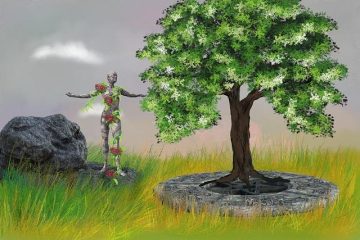In the realm of ancient mythology, where gods and goddesses reign supreme, the name “Gaia” echoes through the ages with an air of reverence and mystery. Known as the primal Greek goddess personifying the Earth itself, she embodies the very essence of nature, fertility, and creation. But delve deeper into the annals of history, and you’ll uncover another facet of this divine figure – her Roman counterpart. Step into the ethereal world of Gaia’s Roman name, where the threads of myth and legend intertwine to reveal a tapestry of awe-inspiring tales and timeless wisdom.
Table of Contents
- Unveiling the Meaning Behind Gaia’s Roman Name
- Exploring the Mythological Roots of Gaia’s Roman Name
- Significance of Gaia’s Roman Name in Ancient Beliefs
- Modern Interpretations and Reflections on Gaia’s Roman Name
- Q&A
- To Conclude
Unveiling the Meaning Behind Gaia’s Roman Name
In Roman mythology, Gaia was known as “Terra Mater,” which translates to “Mother Earth.” This ancient name highlights the reverence and connection the Romans felt towards the Earth as a life-giving force. Gaia symbolized fertility, abundance, and the nurturing aspects of nature, embodying the cycle of life and growth.
The Roman name for Gaia embodies the embodiment of nature’s power and beauty, encapsulating the harmony and balance essential for life to thrive. As Terra Mater, Gaia represented not only the physical Earth but also the spiritual essence of creation and sustenance. This name serves as a reminder of the profound respect and awe ancient civilizations held for the planet we call home.
Exploring the Mythological Roots of Gaia’s Roman Name
In Roman mythology, the earth goddess known as Gaia takes on a different persona with her Roman name, Terra Mater. The Roman adaptation of Gaia embodies the essence of motherhood, fertility, and abundance, resonating deeply with the agricultural traditions of ancient Rome. Terra Mater was revered by the Romans as the nurturer of all living beings, symbolizing the cycle of life and the interconnectedness of nature.
The worship of Terra Mater in Roman culture was steeped in rituals and ceremonies celebrating the bountiful harvests and the vitality of the earth. She was often depicted adorned with fruits, grains, and flowers, emphasizing her role as the provider of sustenance and life. Through the lens of Roman mythology, Terra Mater represents the profound reverence and gratitude that the ancient Romans had for the earth’s abundant gifts, reminding us of the delicate balance between humankind and nature.

Significance of Gaia’s Roman Name in Ancient Beliefs
In ancient Roman beliefs, Gaia, also known as Terra Mater, held immense significance as the primordial goddess of the Earth. This divine entity symbolized fertility, abundance, and the nurturing qualities of the natural world. Gaia’s name derived from the Latin word for “Earth,” emphasizing her connection to the land, plants, and all living beings. In Roman mythology, she was revered as the ancestral mother of all gods and humans, embodying the essence of creation and sustenance.
The worship of Gaia in Roman culture was intertwined with rituals honoring the cycles of nature and the changing seasons. Priests and priestesses paid homage to her through ceremonies celebrating life, growth, and the harmony between humanity and the environment. Followers believed that by honoring Gaia, they were aligning themselves with the life force of the Earth, seeking blessings of prosperity, health, and renewal. The reverence for Gaia’s Roman name reflected a deep-rooted respect for the interconnectedness of all living things and the importance of living in harmony with the natural world.
Modern Interpretations and Reflections on Gaia’s Roman Name
Exploring the rich history and symbolism behind Gaia’s Roman name, Terra Mater, uncovers fascinating insights into ancient beliefs and the natural world. In Roman mythology, Terra Mater was revered as the goddess of the earth, embodying fertility, abundance, and nurturing characteristics. This divine figure symbolized the interconnectedness of all living beings and the cyclical nature of life.
Modern interpretations of Terra Mater often highlight environmental conservation, sustainability, and the importance of preserving our planet. Reflecting on Gaia’s Roman name not only invites us to honor the earth but also encourages us to cultivate a deeper sense of reverence for nature and promote harmony between humanity and the environment. By embracing the essence of Terra Mater, we can strive to protect and cherish the earth for future generations.
Q&A
Q: What is the Roman name for Gaia?
A: The Roman name for Gaia is Terra. In Roman mythology, Terra was the goddess of the earth, equivalent to the Greek goddess Gaia.
Q: How was Terra, the Roman goddess of the earth, depicted?
A: Terra was often depicted as a matronly figure, symbolizing fertility and abundance. She was typically shown holding fruits, grains, and flowers, representing the bountiful nature of the earth.
Q: What role did Terra play in Roman mythology?
A: Terra, or Gaia in Greek mythology, was considered the personification of the earth itself. She was seen as the mother of all life, nurturing and sustaining all living beings on the planet.
Q: Were there any specific rituals or festivals dedicated to Terra in ancient Rome?
A: Yes, the Romans celebrated a festival called the Fordicidia in honor of Terra. This festival, held in April, involved the sacrifice of pregnant cows to ensure fertility and abundance for the land.
Q: How did the concept of Terra influence Roman culture and beliefs?
A: The reverence for Terra as the earth goddess shaped Roman attitudes towards nature, agriculture, and the cycle of life. It instilled a sense of gratitude and responsibility towards the natural world.
To Conclude
As we navigate through the vast realms of mythology, the unveiling of Gaia’s Roman name brings forth a deeper connection to the earth and its timeless essence. Embracing the significance of Terra Mater, the Roman embodiment of Mother Earth, invites us to embrace reverence for our planet and all its wonders. Let us carry this ancient wisdom with us, honoring Gaia in her Roman form, as we tread lightly on this sacred ground we call home. May the spirit of Terra Mater guide our steps towards harmony and balance, reminding us of the interconnectedness of all living beings. In our modern world, may we echo the respect and admiration that the Romans held for Gaia, ensuring a legacy of protection and preservation for generations to come.



0 Comments